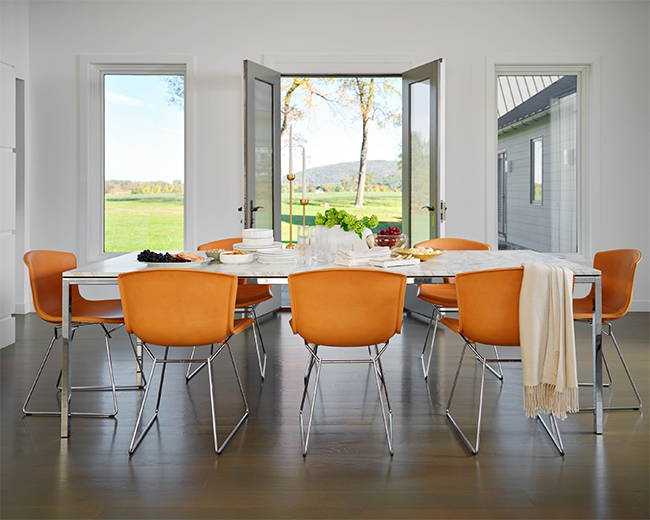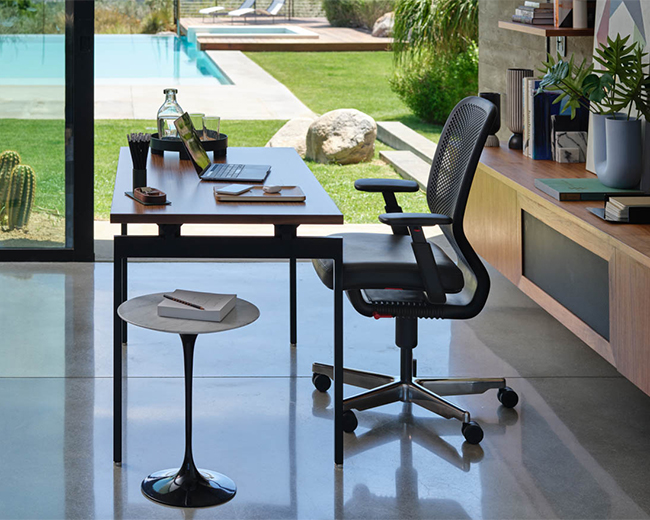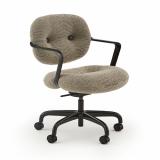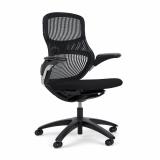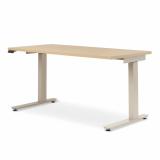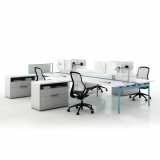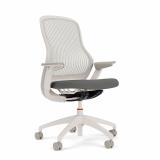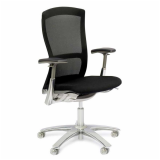Allwork, an online forum that explores the dynamics of the workplace and future of work, published a recap of the Knoll k. talks session on coworking and flexible workspaces, exploring the next phase of flexible spaces in light of the Covid-19 pandemic.
Three experts—Ryan Simonetti of Convene, Tim Rowe of Cambridge Innovation Center and Liz Elam of GCUC—shared their insights with Knoll Senior Director, Workplace Research, Kylie Roth, on what the future of work could look like, highlighting a hybrid model of the workplace that incorporates a mix of regional flexible spaces and remote work. Additional insights can be found in Knoll Workplace Research k. talks insights: Coworking and Flexible Spaces as well as the k. talks replay.

Allwork reports:
As a hybrid workplace emerges in the post-pandemic environment, and organizations roll out a distributed work strategy with both physical and remote locations, coworking and flexible spaces are poised to play a vital role in the transition and economic recovery.
Speaking at a Knoll k. talk webinar, three founders in the space-as-a-service industry shared their opinions on how coworking and flexible spaces play into the next phase of the work and meeting space business. Ryan Simonetti, CEO and co-founder of Convene; Tim Rowe, CEO and founder of Cambridge Innovation Center (CIC); and Liz Elam, founder of the Global Coworking Unconference Conference (GCUC), spoke with Knoll’s senior director of research Kylie Roth on why they expect significant upturns in the industry.
COVID has accelerated trends that were underway in the space-as-a-service category, a segment that typically operates at a higher-than-average level of speed and innovation. To survive and thrive in the post-pandemic climate, workspace operators will be required to pivot business models, update physical workspaces, enter new partnerships and launch new businesses.
Some key takeaways from the conversation:
In times of uncertainty, flexibility and agility are more important than ever.
Panelists observed parallels between the current economic environment and the 2008 financial crisis. The desire to outsource real estate accelerated in 2009 and 2010 as waves of people gravitated toward spaces that were more flexible as an alternative to signing five and 10-year leases in uncertain times.
“We’re hearing from our customers that flexibility is needed more today than probably ever before,” said Simonetti, who co-founded Convene on the heels of the 2008 financial crisis.
“And so, as we work our way through this crisis, not just in the short term or even medium to long term, I think that flex and coworking are a strategic part of that recovery and have a massive role to play within the industry at scale,” Simonetti noted.
Rowe concurred. “In October 2010, we saw revenues grow by about 50% during those 24 months immediately following the crisis. And I think something of that nature will happen again,” he said, noting that leading indicators were already showing strong recoveries in recently re-opened overseas locations.
Space-as-a-service will thrive in a more complex environment.
As operations become more complex with new safety and security requirements, and compliance becomes more challenging, outsourcing becomes an appealing strategy for organizations that simply want to focus on their core competency and not worry about bringing physical workspaces up to stringent new standards. Enter space-as-a-service providers.
“The cost and complexity of running space today just increased exponentially,” Simonetti stated. Space operators are experts who focus solely on managing work, meeting and event spaces, and have well-developed infrastructure, talent and training strategies, and technology in place to manage a changing landscape.
“We are uniquely positioned because we’ve had to go through the process and the journey over the last 60 plus days to rethink the way that you actually fundamentally design, run, operate space and still deliver a premium hospitality experience in a post-COVID world,” explained Simonetti. “When I think about the future of flexible work and coworking, there’s a tremendous amount of value in the operating platforms and capabilities that we’ve built as companies.”
The future of work is distributed and that bodes well for coworking and flexible workspaces.
When major organizations such as Barclays announce they will not return an entire workforce to a single stand-alone building, that signals a move to geographical diversification which is a win for suburban and rural coworking, noted Elam.
“So what we’re seeing happen, and research firms such as Instant have reported back, is a spike in corporations coming to them for spaces in smaller markets. There is going to be a big uptick because there is a big opportunity in this market and that’s not going away.”
“And we have seen that happen as Asia has come back,” added Elam, who produces coworking conferences on five continents. In CIC’s Warsaw location, where bars and restaurants have reopened, sales are actually ahead of pre-COVID predictions, according to Rowe.
It's about choice.
The industry is taking note of the unofficial results of the world’s largest coworking experiment.
“We’ve just almost completed the world’s largest work from home experiment,” Elam shared. “And what we figured out is that working with kids is not optimal. Working with dogs is not always optimal,” adding that while home isn’t always the best place to conduct work, it’s one of the great options.
For at least the last five to six years, choice, flexibility and experience have emerged as the three criteria that individual users – not companies – desire in the workspace, according to Simonetti whose firm has studied customer trends at both the individual and the company level since its founding. Today, the desire and expectation for choice has never been stronger.
“In the past, most people didn’t really have the option to choose where they work,” said Simonetti. But post-COVID, things changed. “People want choice. We’re one of the winning choices and we will continue to be so,” said Elam. “So, I think choice is going to be a big thing in the future and that does lead to flexibility,” she emphasized.
“A lot of people are really antsy to get back to work, some of the time,” observed Rowe. “They’re also saying, ‘Wow, work from home does kind of work and I want to do that more than I did before,’ so we’re going to see a mix there." “Some companies like Facebook and Twitter have said ‘Look, people can just work from home as long as they want,’” said Rowe. However, for all the predictions that larger companies may drop as much as half of their office space, he observed otherwise.
We’re in a full opt-in choice-based model, panelists agreed. “I believe moving forward, at least for the next 12 to 18 months, there is not a CEO in the world that’s going to force somebody to show up at their office. And employees therefore have the choice to either work from home or work from a coffee shop, my HQ or a third space,” Simonetti related.
Human’s need for community will drive us back to the office.
Our basic desire as social animals will be one of the strongest factors driving people back to the office, according to panelists. “Working from home is actually hard and stressful at times,” said Elam. “We are humans and we crave and need community. So, people are really excited about going back to the office. People are going to flock back to spaces for meetings, for one-on-ones, for video conferencing options. So, it’s actually going to be a very good thing for the industry long term.”
“I think that there’s a natural human desire to be around other people to share your interests and so forth and I think you’re going to see that come back very strong,” agreed Rowe. “I actually think we’re going to be surprised at how quickly things move to a new normal.”
And once people return to a good shared workplace, we can expect them to be there for a very long time, according to Rowe, whose average client stay in CIC’s Cambridge facilities is now over six years. “So, this is longer than you’d spend in college. So, you’re choosing a community. And so, you should ask: what does your community need to do for you?”
Wellness will be the ultimate amenity.
While the right amenities will continue to be an important draw to attract people back to the office, health and wellness will be among the most valued and desired amenity. Moreover, the workplace plays an integral role in health and wellbeing.
Can the workplace avert a pending mental health crisis? Work from home has revealed some flaws in the model.
Coworking began as a way for people who did not want to work at home alone to create their own community and support network, Roth reminded the panel.
“Not everybody has a family, and there’s also a full-on loneliness epidemic. Before COVID, the number one most expensive thing facing all companies globally was depression,” said Elam. “Do you think sending everybody home is making that better? No, it’s making it 10 times worse. So, we’re going to have a whole other crisis on our hands when the press stops paying attention to COVID and starts paying attention to the suicides, and the overdoses and all the other things that are still going on in the background. So, I think the amenities that are going to be highly valued in the future are really around not only physical health, but more around mental health,” said Elam.
Simonetti added, “We can’t underestimate the impact that this crisis has had on people’s mental well-being. We’re seeing that one of the most highly utilized amenities that Convene offers is access to the Eden Health platform.”
To register for upcoming k. talks, click here.

